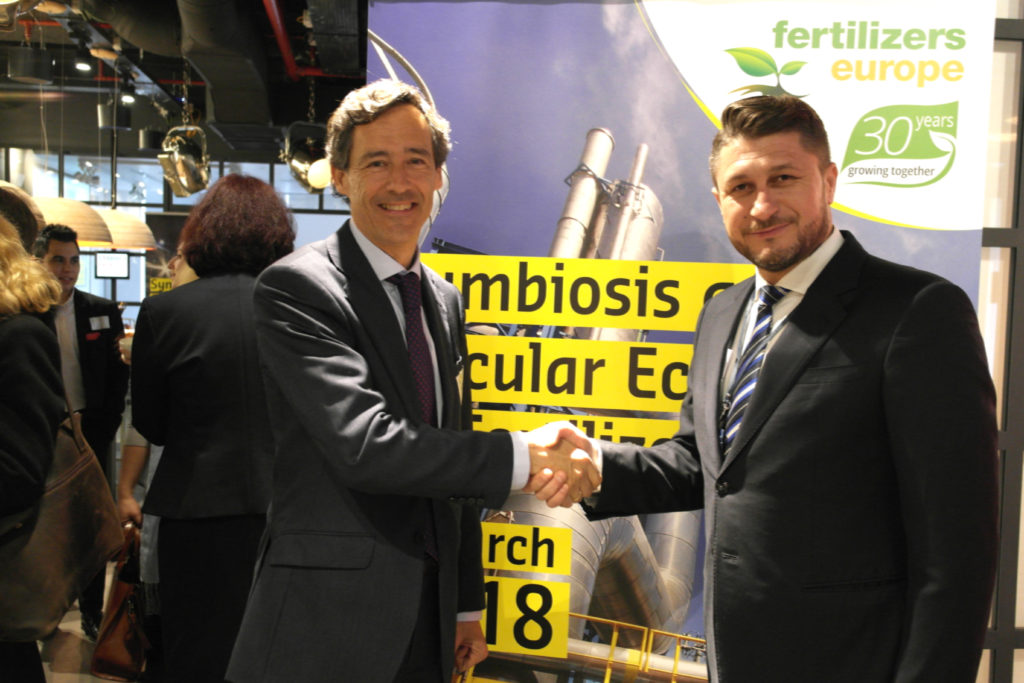
Symbiosis and Circular Economy in Fertilizers
The adoption of the New Fertilisers Regulation as it is proposed by the European Commission would imply that any product where “by-products” have been used at any stage in production would effectively be excluded from the ‘EU Fertiliser’ label. This would cause serious consequences in the fertilizer industry, banning most fertilisers today on the market. The use of by-products is not only core to the industry that has been optimising its processes for hundreds of years, but it is also a key contributor to Circular Economy in Europe. The seminar “Symbiosis and Circular Economy in Fertilizers” organised by Fertilizers Europe brought together industry experts, EU legislators and national authorities to exchange perspectives on how improve the Fertilisers Regulation and ensure a continuation of good circular practices.
Javier Goñi del Cacho (CEO Fertiberia & President of Fertilizers Europe) and Jacob Hansen (Director of Fertilisers Europe), underlined that the fertilisers industry has been since its foundations a frontrunner in Circular Economy, saving nutrients, energy, costs and precious resources. The Fertilisers Regulation must enable this to continue, be open to innovation on resource use and ensure quality and safety of products delivered to the farmers.
A survey of 6 large fertilizers producers presented by Tiffanie Stephanie (Fertilizers Europe) showed that of 500 mineral fertiliser CE marked products they currently have in the market, 75% use by-products in their production. Case studies and industry perspectives brought by Joaquim Queisser (BASF), Javier Brañas, (Fertiberia), Amaury Rosier (Solvakem) and Rachel Lombardi, (Industrial Symbiosis) showed the importance of circularity in the European fertilizer industry which is also largely dependent on imports for phosphorus supply and natural gas (natural gas is 62-84% of production cost of N fertilisers) and has only 2% of the world’s potassium reserves (90% are in Russia, Bielorussia and the USA). Also the importance of R&D needed to develop knowledge on safety and effectiveness was raised by prof. Claudio Ciavatta (Bologna University Italy).
On the other side from the political agenda, Stéphane Murieux (French Institute for the Circular Economy), underlined that the circular economy is a priority of the Macron government, and invited input to the working group on agriculture circular economy. Furthermore, Tatu Liimatainen (Cabinet of EC Vice-President Jyrki Katainen), underlined the importance of the EU Fertilisers Regulation, as a key initiative of the Commission’s Circular Economy Package and showed his full support for finding solutions. Mihai Ţurcanu MEP (Rapporteur for the European Parliament IMCO Committee), indicated that Parliament has adopted two amendments aiming to address this issue which has been taken on board by the European Parliament, Council and the Commission in the current trilogue discussions, and the challenge is now to reach a workable legal wording. He also underlined the shared objective to finalise the before the end of legislation.
Chris Thornton (European Sustainable Phosphorus Platform) reminded that covering a wide range of industries, the fertiliser regulation is highly ambitious. Critical challenges are posed to the different stakeholders that need to work together and propose workable solutions. Also complexity is due to the fact that it is the first time that EU product legislation will confer “End-of-Waste” status, and is already addressing the REACH/chemicals/waste interface. It is therefore important to maintain Commission “delegation” to modify the annexes and to anticipate development of Commission Guidance Documents to support implementation by companies and by Member States.
The seminar was concluded by raising the importance of the dialogue in the coming weeks between trilogue (Parliament, Council, Commission), industry and stakeholders in order to ensure that the final text combines legal soundness, industry workability and stakeholder acceptability. The inclusion of a “positive list” of all identified by-products was rejected by most participants as unrealistic and contrary to future innovation.
Concluding remarks of Javier Goñi del Cacho (CEO Fertiberia & President of Fertilizers Europe) highlighted that a solution has to be found to allow the fertilizer industry continue to be circular, and the legislator should build upon existing pieces of legislation such as REACH, without creating unnecessary bureaucracy and burden for the industry.